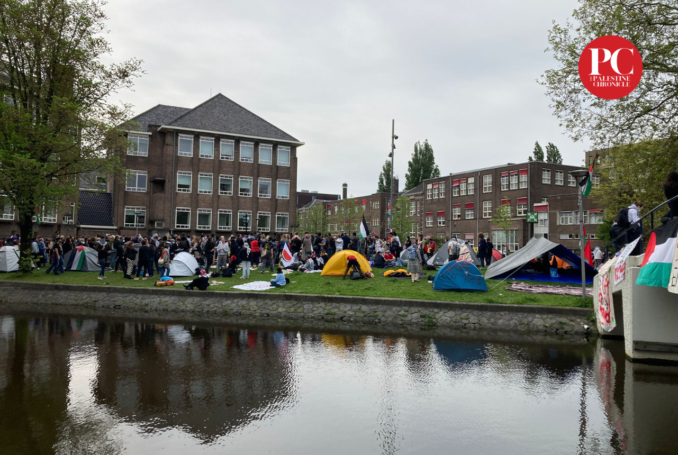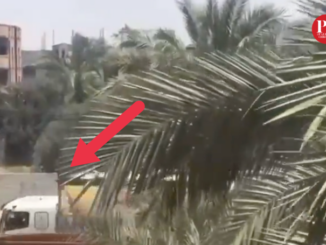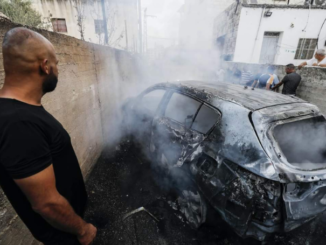NGOs Sue Dutch Government – Call for Suspension of Arms and Cutting Ties

“The Netherlands has an obligation to take all reasonable steps within its power to prevent genocide in Gaza and to ensure Israel complies with international humanitarian law in the OPT (Occupied Palestinian Territories).
A coalition of Palestinian and Dutch NGOs have filed a lawsuit against the Dutch government, accusing it of failing to meet its international obligations regarding Israel’s ongoing genocidal war on Gaza.
In a statement, Al-Haq, one of the organizations involved said it “sued the the Netherlands for failing to meet its international legal obligations and has called on the court to enforce corrective measures,” including a ban on the transit of weapons to Israel as well as a severance of all relations with the state.
“In court, it was clear that the Dutch State deems its ongoing dialogue with Israeli counterparts sufficient to prevent genocide against the Palestinian people in Gaza,” Al-Haq said following the first hearing at The Hague District Court on Friday.
“Additionally, the State argued that it is legal for Dutch corporations to do business in the illegal Israeli settlements,” it continued. “However, the Netherlands has an obligation to take all reasonable steps within its power to prevent genocide in Gaza and to ensure Israel complies with international humanitarian law in the OPT (Occupied Palestinian Territories).”
Main Demands
The organizations are calling on the court to order the Dutch government to “Ban the export and transit of weapons, weapon components, and dual-use items to Israel,” as well as “Ban all trade and investment relations that sustain Israel’s illegal occupation, racial discrimination, segregation, and settlements.”
Speaking to the Anadolu news agency, Ahmed Abofoul, legal advisor for Al-Haq, said the government had admitted in court that “Israel’s occupation and presence in Gaza are illegal.”
He therefore questioned the government’s continued support of Israel’s illegal presence in the occupied Palestinian territories.
“We are witnessing a campaign of destruction, particularly in northern Gaza. The entire Gaza Strip faces famine, with starvation being used as a weapon of war. As winter approaches, people are living under dire conditions,” said Abofoul.
“In the West Bank, we presented evidence of Israel expanding colonial settlements, continuing attacks on Palestinians, arming illegal settlers, and granting them impunity,” he added.
“We hope the court will instruct the government to end its contributions to these violations of international humanitarian law and cease supporting the illegal occupation,” the legal advisor stressed.
Export Licenses ‘Monitored’
Wout Albers, the lawyer representing the coalition, emphasized that the confirmed death toll in Gaza since Oct. 2023 has exceeded 44,000, while unofficial estimates suggest over 200,000 deaths due to injuries, diseases, and lack of basic necessities.
Albers argued that the Dutch government has not made sufficient efforts to address the serious violations of international law while maintaining political, economic, and military ties with Israel.
The Dutch government’s lawyers argued that export licenses to Israel are continuously monitored, considering the potential military use of exported products, said Anadolu.
They also claimed that military cooperation with Israel benefits the Dutch armed forces and is a matter of foreign policy.
The government’s defense team asserted that imposing an indefinite and undefined trade ban on Israeli firms could jeopardize Dutch national security.
They also argued that the plaintiffs failed to provide sufficient evidence to prove how the Netherlands directly contributes to Israel’s alleged crimes and requested the dismissal of the case.
‘Cannot Stay Passive’
Albers, according to Al-Haq’s statement, pointed out that “The Netherlands has discretion on how it fulfills its legal obligations.”
“However, international law prescribes that it cannot stay passive, and its actions cannot run counter to the Genocide Convention and Geneva Conventions. The Dutch judicial system is tasked with reviewing the lawfulness of Dutch policy,” he added.
Regarding its policy towards trade with settlements, the State “presented a contradictory position,” said Al-Haq.
“On the one hand, it says to have held a hundred meetings with Dutch corporations in which they explain their so-called discouragement policy,” the organization said, adding that it also refers to the International Crimes Act, which can hold actors to account for their involvement in the settlements.
“However, the bottom line of the policy remains that it is up to companies to decide whether they do business in the settlements,” said Al-Haq.
“How can this be the State’s message to companies?”, Daan de Grefte, legal officer at ELSC, argued, according to Al-Haq.
“The ICJ has made it crystal clear that this does not go far enough,” de Grefte said.
‘High Stakes’
The stakes in this case are high, said Al-Haq.
“Almost a year ago, the ICJ indicated that Israel’s actions in Gaza may constitute genocide, placing a duty on states to act to prevent it. Furthermore, the ICJ has also ruled that Israel’s policies in the OPT violate fundamental principles of international law,” it noted.
“Failure by the Netherlands to act threatens Palestinian lives, exacerbates their suffering and undermines international law. Without domestic enforcement of international rulings, the foundation and credibility of the international legal system are at risk,” the organization said.
The coalition of plaintiff organizations includes Al-Haq, Al-Mezan, the Palestinian Centre for Human Rights, Dutch organization Een Ander Joods Geluid (EAJG), the European Legal Support Center (ELSC), and SOMO.
The court’s judgment is expected on Friday, December 13, according to Al-Haq.
(PC, Anadolu)

Copyright © 1999-2024 PalestineChronicle.com. All rights reserved | Powered By Media Seniors














Leave a Reply